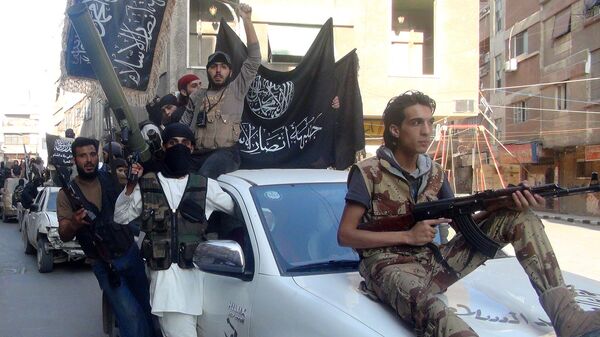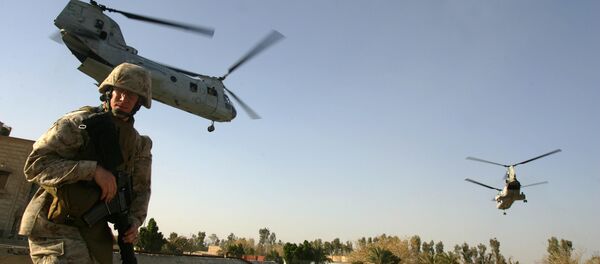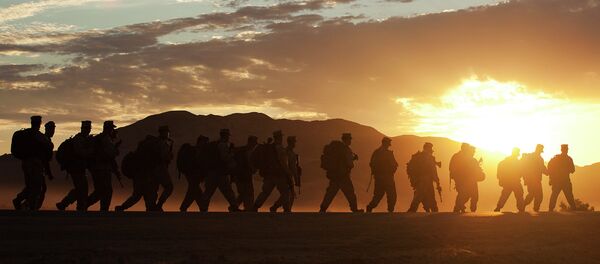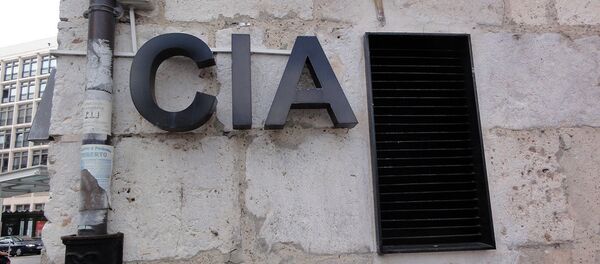Al-Nusra Front, the Syrian branch of the al-Qaeda global terrorist network, is more dangerous to the United States than Daesh, the terror group which has captured large swathes of Iraq and Syria and established a self-proclaimed caliphate in the areas it controls.
Such are the findings of a new 40-page report by two respected Washington-based think tanks – the Institute for the Study of War and American Enterprise Institute.
Unlike its Daesh counterparts, al-Nusra Front has not transformed into a territorial state, or made any promises of governance that it cannot deliver. Instead, operating within a big-tent coalition, al-Nusra "provides advanced military capabilities to its partners that make them both dependent on [the terror group] and grateful to it such that they willingly provide Al-Nusra cover and at least rhetorical protection, even against US activities precisely targeting the elements of al-Nusra oriented on attacking the West."
Criticizing Washington's 'Daesh-centric' anti-terrorism strategy, the report emphasizes that ultimately, "any strategy that leaves Jabhat al-Nusra in place will fail to secure the American homeland."
Speaking to CNN about the report, US political advisor Kimberly Kagan, one of the report's coauthors, suggested that at the moment, "al-Nusra is quietly intertwining itself with the Syrian population and Syrian opposition…waiting in the wings to pick up the mantle of global jihad once [Daesh] falls."
National Intelligence Director James Clapper, CNN recalls, had told the Senate Intelligence Committee in January 2014 that al-Nusra has "aspirations for attacks on the homeland." Nevertheless, in the DNI's 2015 Threat Assessment Report before the Senate Armed Services Committee, the group was listed only as a regional threat, and not a global one.
Asked to comment on the report by the independent Russian newspaper Svobodnaya Pressa, Sergei Balmasov, a senior analyst at the Center for the Study of the Crisis of Society, suggested that really, the distinction between Daesh and al-Nusra Front is relative.
"When Daesh took control of Raqqa in 2013, it handed over half of its loot to al-Qaeda, and not to the Syrian branch, but to AQIM – al-Qaeda in the Islamic Maghreb, led by Abdelmalek Droukdel. This is just one episode demonstrating the groups' active cooperation with one another. Moreover, there have been many cases of fighters from al-Nusra going over to Daesh, and vice-versa."
Furthermore, pointing to the think tanks' connections to the Pentagon, and hawkish planners' push to expand US military operations in Syria, Balmasov warned that what's important now is to pay close attention "to see how the report will be received by the military and political leadership in Washington."
"After all, al-Nusra comes into contact with Syrian government forces much more often than Daesh does. Al-Nusra Front units are fighting in the suburbs of Damascus, in the center and south of the country. In other words, if Washington joins the fight against the terror group, US bombs would begin falling on much more of Syria's territory" than presently.
"With regard to the [differences in the] objectives of Daesh and al-Nusra, al-Qaeda has, for its part, always considered the struggle against the so-called [Western] 'crusaders', rather than the construction of a caliphate, to be the main goal. It can therefore be said that Daesh is a kind of evolution of the ideological struggle waged by al-Qaeda. But the movements are very similar in their essence."
For his part, Vyacheslav Matuzov, a veteran former diplomat and Middle East analyst with decades of expertise in the region under his belt, took a harder line, telling the newspaper that ultimately, the global jihadist terrorist groups including both Daesh and al-Nusra, along with their regional sponsors, are really just creatures of interest groups which operate at a global level.
"When we read the reports of certain US analytical centers, we must understand that there is a deliberate distortion of the situation occuring – that everything is topsy-turvy. In reality, al-Nusra and Daesh are products of American policy. One group is dealt with by the DIA – the other, by the CIA, while the employees of various institutes and policy centers are involved in the development of methodologies for further action. Their reports, which supposedly present methods to combat terrorism and carry out risk analysis, are then circulated to the media and discussed in all seriousness."
"Occasionally, the American people are enlightened on what is really going on, but one day they 'see the light', and the next, they either close their eyes again, or have the wool pulled over them. What's important to understand is that this is not a state policy, but the action of individual stakeholders looking to benefit financially. It's not as if Barack Obama is sitting in a chair, twirling a globe and pointing with his finger on where the next revolution must be organized."
"In any case," Matuzov notes, "this report does have one important detail: today, al-Nusra is a key force within the Syrian opposition, or as the Americans call it, the 'moderate opposition'. Now, a screening process has begun to determine who will participate in the Syrian peace negotiations in Geneva. Unfortunately, most of the groups which are fighting the Syrian government are associated with al-Nusra."
Washington, for its part, "is dragging Ahrar al-Sham and Jaish al-Islam, organizations closely associated with Al-Nusra Front, into the negotiations process. The question which naturally arises is: why is the US is doing this, instead of following the recommendations of the AEI/ISW report? In other words, why aren't they fighting against global terror?"
For their part, policymakers in Moscow and Damascus don't seem to be too concerned about the subtle distinctions between the jihadist terrorist groups operating in Syria, and attack all of them simultaneously and with equal relish.






